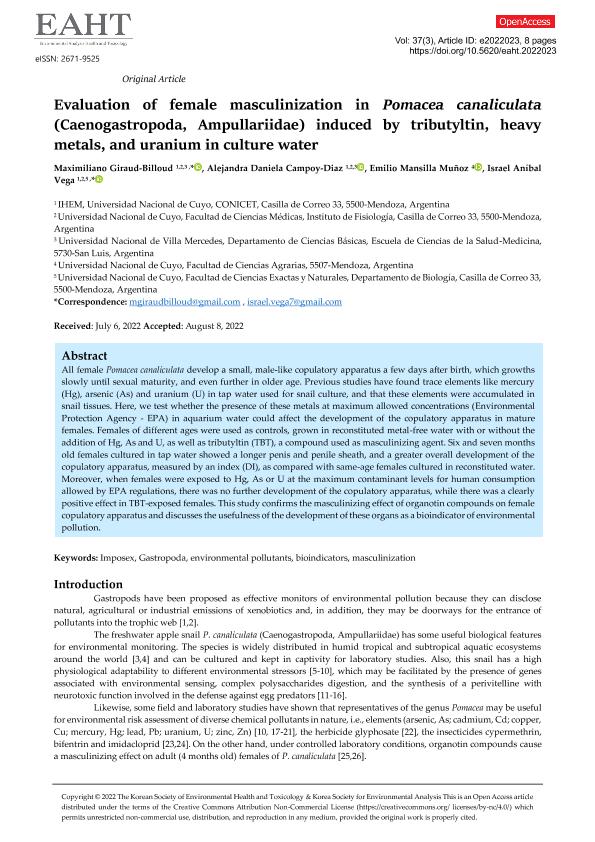Artículo
Evaluation of female masculinization in Pomacea canaliculata (Caenogastropoda, Ampullariidae) induced by tributyltin, heavy metals, and uranium in culture water
Giraud Billoud, Maximiliano German ; Campoy Díaz, Alejandra Daniela
; Campoy Díaz, Alejandra Daniela ; Mansilla, Emilio; Vega, Israel Aníbal
; Mansilla, Emilio; Vega, Israel Aníbal
 ; Campoy Díaz, Alejandra Daniela
; Campoy Díaz, Alejandra Daniela ; Mansilla, Emilio; Vega, Israel Aníbal
; Mansilla, Emilio; Vega, Israel Aníbal
Fecha de publicación:
09/2022
Editorial:
Korean Society of Environmental Health and Toxicology
Revista:
Environmental Health and Toxicology
ISSN:
2233-6567
e-ISSN:
2671-9525
Idioma:
Inglés
Tipo de recurso:
Artículo publicado
Clasificación temática:
Resumen
All female Pomacea canaliculata develop a small, male-like copulatory apparatus a few days after birth, which growths slowly until sexual maturity, and even further in older age. Previous studies have found trace elements like mercury (Hg), arsenic (As) and uranium (U) in tap water used for snail culture, and that these elements were accumulated in snail tissues. Here, we test whether the presence of these metals at maximum allowed concentrations (Environmental Protection Agency-EPA) in aquarium water could affect the development of the copulatory apparatus in mature females. Females of different ages were used as controls, grown in reconstituted metal-free water with or without the addition of Hg, As and U, as well as tributyltin (TBT), a compound used as masculinizing agent. Six and seven months old females cultured in tap water showed a longer penis and penile sheath, and a greater overall development of the copulatory apparatus, measured by an index (DI), as compared with same-age females cultured in reconstituted water. Moreover, when females were exposed to Hg, As or U at the maximum contaminant levels for human consumption allowed by EPA regulations, there was no further development of the copulatory apparatus, while there was a clearly positive effect in TBT-exposed females. This study confirms the masculinizing effect of organotin compounds on female copulatory apparatus and discusses the usefulness of the development of these organs as a bioindicator of environmental pollution.
Palabras clave:
BIOINDICATORS
,
ENVIRONMENTAL POLLUTANTS
,
GASTROPODA
,
IMPOSEX
,
MASCULINIZATION
Archivos asociados
Licencia
Identificadores
Colecciones
Articulos(IHEM)
Articulos de INST. HISTOLOGIA Y EMBRIOLOGIA DE MEND DR.M.BURGOS
Articulos de INST. HISTOLOGIA Y EMBRIOLOGIA DE MEND DR.M.BURGOS
Citación
Giraud Billoud, Maximiliano German; Campoy Díaz, Alejandra Daniela; Mansilla, Emilio; Vega, Israel Aníbal; Evaluation of female masculinization in Pomacea canaliculata (Caenogastropoda, Ampullariidae) induced by tributyltin, heavy metals, and uranium in culture water; Korean Society of Environmental Health and Toxicology; Environmental Health and Toxicology; 37; 3; 9-2022; 1-8
Compartir
Altmétricas



